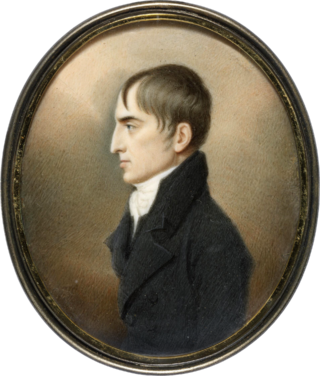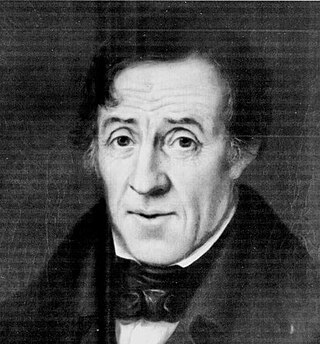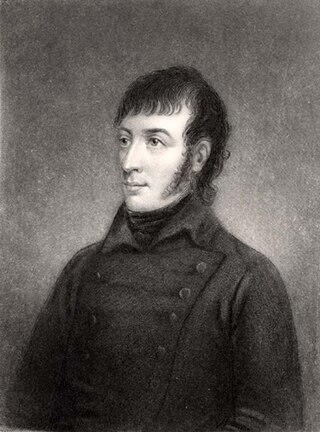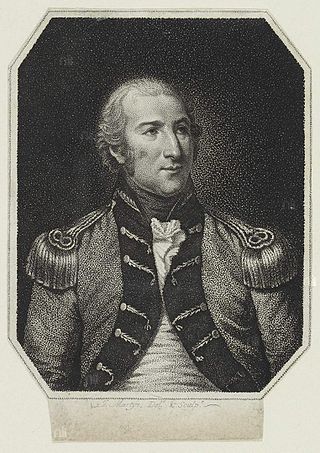| |||||
| Centuries: | |||||
|---|---|---|---|---|---|
| Decades: | |||||
| See also: | 1803 in the United Kingdom Other events of 1803 List of years in Ireland | ||||
Events from the year 1803 in Ireland.
| |||||
| Centuries: | |||||
|---|---|---|---|---|---|
| Decades: | |||||
| See also: | 1803 in the United Kingdom Other events of 1803 List of years in Ireland | ||||
Events from the year 1803 in Ireland.


Robert Emmet was an Irish Republican, orator and rebel leader. Following the suppression of the United Irish uprising in 1798, he sought to organise a renewed attempt to overthrow the British Crown and Protestant Ascendancy in Ireland, and to establish a nationally representative government. Emmet entertained, but ultimately abandoned, hopes of immediate French assistance and of coordination with radical militants in Great Britain. In Ireland, many of the surviving veterans of '98 hesitated to lend their support, and his rising in Dublin in 1803 proved abortive.

The Irish Rebellion of 1798 was a popular insurrection against the British Crown in what was then the separate, but subordinate, Kingdom of Ireland. The main organising force was the Society of United Irishmen. First formed in Belfast by Presbyterians opposed to the landed Anglican establishment, the Society, despairing of reform, sought to secure a republic through a revolutionary union with the country's Catholic majority. The grievances of a rack-rented tenantry drove recruitment.
Events from the year 1916 in Ireland.

Thomas Addis Emmet was an Irish and American lawyer and politician. In Ireland, in the 1790s, he was a senior member of the Society of United Irishmen as it planned for an insurrection against the British Crown and Protestant Ascendancy. In American exile, he took up legal practice in New York, earned a reputation as a staunch abolitionist, and in 1812 to 1813 served as the state's Attorney General.

Anne Devlin was an Irish republican who in 1803, while his ostensible housekeeper, conspired with Robert Emmet, and with her cousin, the rebel outlaw Michael Dwyer to renew the United Irish insurrection against the British Crown. When their plans for a rising in Dublin, the Irish capital, misfired, she endured torture and imprisonment. Outrage over her treatment secured her release in 1806, after which she was assisted for a period by the Emmet family. A long working life as a laundress ended in destitution.

James "Jemmy" Hope was a radical democrat in Ireland who organised among tenant farmers, tradesmen and labourers for the Society of the United Irishmen. In the Rebellion of 1798 he fought alongside Henry Joy McCracken at the Battle of Antrim. In 1803 he attempted to renew the insurrection against the British Crown in an uprising coordinated by Robert Emmett and the new republican directorate in Dublin. Among United Irishmen, Hope was distinguished by his conviction that "the fundamental question at issue between the rulers and the people" was "the condition of the labouring class".

Michael Dwyer was an insurgent captain in the Irish Rebellion of 1798, leading the United Irish forces in battles in Wexford and Wicklow., Following the defeat and dispersal of the rebel hosts, in July 1798 Dwyer withdrew into the Wicklow Mountains, and to his native Glen of Imaal, where he sustained a guerrilla campaign against British Crown forces.

Thomas Paliser Russell was a founding member, and leading organiser, of the United Irishmen marked by his radical-democratic and millenarian convictions. A member of the movement's northern executive in Belfast, and a key figure in promoting a republican alliance with the agrarian Catholic Defenders, he was arrested in advance of the risings of 1798 and held until 1802. He was executed in 1803, following Robert Emmet's aborted rising in Dublin for which he had tried, but failed, to raise support among United and Defender veterans in the north.
Events from the year 1803 in the United Kingdom.

MylesByrne was an insurgent leader in Wexford in the Irish Rebellion of 1798 and a fighter in the continued guerrilla struggle against British Crown forces in the Wicklow Hills until 1802. In 1803 collaborated closely with Robert Emmet in plans for a renewed insurrection in Dublin. After these misfired, he took a commission in Napoleon’s Irish Legion, seeing action in the Low Countries, Spain and at the Battle of Leipzig. Under the Bourbon Restoration he was deployed to Greece, and retired as a chef de bataillon. In his later years, he was the Paris correspondent for the Young Irelander paper The Nation, and dictated his memoirs. In these, he advanced the image of the United Irishmen as a cohesive revolutionary organisation dedicated to the achievement of a national democratic government.
Events from the year 1868 in Ireland.
Events from the year 1767 in Ireland.
Events from the year 1798 in Ireland.

Henry Charles Sirr was an Anglo-Irish military officer, policeman, merchant and art collector. He played a prominent role in suppressing the Irish Rebellion of 1798, which included personally killing Society of United Irishmen leader Lord Edward FitzGerald, who Sirr alleged had been resisting arrest.

The Irish rebellion of 1803 was an attempt by Irish republicans to seize the seat of the British government in Ireland, Dublin Castle, and trigger a nationwide insurrection. Renewing the struggle of 1798, they were organised under a reconstituted United Irish directorate. Hopes of French aid, of a diversionary rising by radical militants in England, and of Presbyterians in the north-east rallying once more to the cause of a republic were disappointed. The rising in Dublin misfired, and after a series of street skirmishes, the rebels dispersed. Their principal leader, Robert Emmet, was executed; others went into exile.

Arthur Wolfe, 1st Viscount Kilwarden was an Anglo-Irish peer, politician and judge, who held office as Lord Chief Justice of Ireland. He was assassinated during the Irish rebellion of 1803.
Ireland was involved in the Coalition Wars, also known as the French Revolutionary (1792–1802) and Napoleonic (1804–1815) Wars. The island, then ruled by the United Kingdom, was the location of the Irish Rebellion of 1798, which was aided by the French. A minor, abortive uprising in 1803 resulted in the death of Ireland's chief justice, although this rising was not aided by the French.
Michael Reynolds was the leader of the United Irish Kildare rebels during the Battle of Naas.
George Cummins, also spelt George Cummings, was a Scotch-Irish American, active in Ireland in the revolutionary Society of United Irishmen and following his return to the United States after the Irish Rebellion of 1798, in the politics of the Democratic-Republican Party.
William Putnam McCabe (1776–1821) was an emissary and organiser in Ireland for the insurrectionary Society of United Irishmen. Facing multiple indictments for treason as a result of his role in fomenting the 1798 rebellion, he effected a number of daring escapes but was ultimately forced by his government pursuers into exile in France. With the favour of Napoleon, he established a cotton factory at Rouen while remaining active as a member of a new United Irish Directory. He worked to assist Robert Emmett in coordinating a new rising in Ireland in 1803, and later had contact with the Spencean circle in London implicated in both the Spa Field riots and the Cato Street Conspiracy.